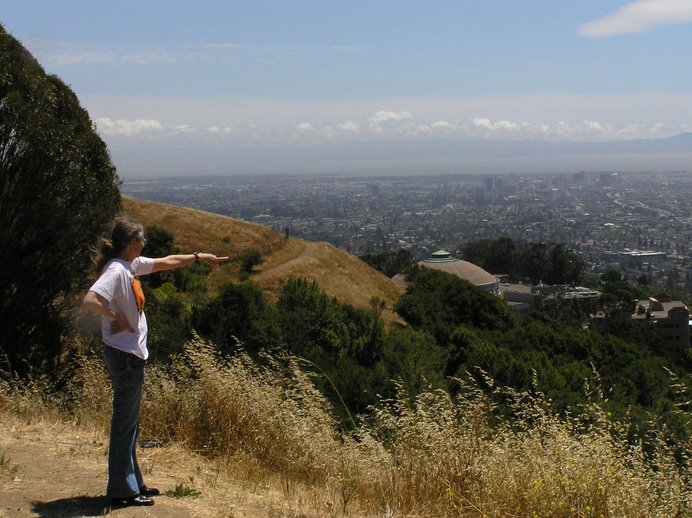






Brother can you spare a dime: Storefronts, senior citizens & stimulus packages
Here in Berkeley, there's a big debate raging right now. Does that mean that we are all busy debating Berkeley's usual political hot-button topics such as whether or not it's fair that Israeli neo-cons can pump thousands of rockets into Gaza, kill over 900 un-armed civilians and still not get in trouble with the UN -- but if North Korea even dares to try to launch even one measly fizzling rocket into the freaking Pacific, the UN is all over the DPRK like white on rice? Nope. That's not the hot debate topic in Berkeley these days.
And this latest Berkeley debate hasn't caused us to go raging in protest all through the streets either. Instead, this debate is taking place down at the zoning commission.
"With so many empty storefronts on our main shopping streets right now," argues one business owner, "the zoning board should allow us to convert some of them into office space."
"But if you do that," argues another store proprietor, "then the shopping district will look less prosperous, and customers will see all those retail stores that have been converted to office space and go to shop elsewhere."
And everyone here is also debating what else we can do about all those now-empty storefronts. Remodel them? Lower their rents?
According to the Berkeley Daily Planet, "A quick survey of the number of vacant spaces on Shattuck carried out by the Planet and [city councilmember Jesse] Arreguin on April 3 revealed 15 vacant storefronts in the nine-block span between University Avenue and Dwight Way." That's a lot of vacant real estate.
"Ito Ripsteen, a partner with Gordon Commercial, which owns much of the retail space downtown," continued the Planet article, "said that for the right kind of tenant, 'rent would not a problem.' Ripsteen [also] said that his company was breaking down larger floor spaces into smaller portions in an effort to make leasing more flexible."
And this debate over vacant storefronts isn't just going on here in Berkeley. All across America, "For Lease" and "For Rent" signs are springing up like mushrooms on all of our main streets. So. What can we do to solve this problem? Surely we can utilize these empty storefronts for something else besides just cluttering up the landscape with abandoned commercial real estate. But what CAN we use them for? Got any suggestions? Offices, housing, churches, schools, daycare centers? Hopefully not soup kitchens.
And like any other good Berkeley resident when faced with a debate, I am fully prepared to take sides -- and throw in my two-cents-worth in favor of the side that is advocating re-zoning our main streets in ways that will allow more flexibility regarding the mixed use of commercial areas.
And we could also apply this same mixed-use tactic to areas that are now zoned strictly residential. What about all those foreclosed-upon and abandoned homes in the suburbs? Perhaps some of them might be converted to neighborhood shops? Mixed-use residential areas too? Why not. Jane Jacobs would definitely approve. Hey, I didn't get a masters in city planning for nothing!
And speaking of housing, I currently know at least five people who are desperately looking for places to live right now. Brother can you spare a storefront?
And one of the people I know who is desperately looking for housing is a senior citizen on Social Security. "I only receive $850 a month," he told me, "but the YMCA charges $35 a night, dormitory-type hostels charge $30 a night, a flea-bag SRO hotel here is $1,000 a month and the average room rent for a shared apartment in Berkeley is approximately $950 a month. After I've paid for shelter, how much would that leave me to spend on food, etc? You do the math."
Plus all the HUD-sponsored senior housing in Berkeley that is actually affordable now has a one-to-five-year waiting list -- that is, if you can get on the waiting list at all. Geez Louise. You work hard all your life and then you end up couch-surfing.
In order to help my homeless friend out today, I went down to the local homeless shelter and looked around. Actually, it wasn't all that bad. They have lockers where homeless people can store their belongings, and free bathrooms and showers. And they have four or five little cubby-hole rooms there, containing four to six bunk beds each. Homeless men can sleep there overnight from 6:00 pm to 7:00 am, giving them a warm bed out of the rain and a safe place to stay. The shelter also has counselors available to help homeless people search for permanent homes and jobs. If my senior friend goes there, he is gonna be stylin'!
Yeah right.
Or else, like another senior friend of mine on Social Security, you could go out and look for jobs in order to supplement your income. Pounding the pavement at age 70? Not fun. Sure, you meet a lot of interesting people in the corporate HR departments and the state employment development centers, but who is going to actually hire you?
Then there's me. I live in a run-down housing co-op that, due to poor decisions made over the years by its inept board of directors, can't even afford to pay our gardener at this point in time. But. On April 21st, the City of Berkeley is holding a hearing to see who will be eligible to receive community block grants from its federal housing stimulus package. That would be me!
So. What can America do to solve all these problems? Here's a fabulous suggestion: Let's take all those trillion-dollar stimulus packages away from the creeps at AIG who, according to Rolling Stone journalist Matt Taibbi, caused all this economic disaster in the first place. According to Taibbi, "The best way to understand the financial crisis is to understand the meltdown at AIG....
This is a company that built a giant fortune across more than a century by betting on safety-conscious policyholders — people who wear seat belts and build houses on high ground — and then blew it all in a year or two by turning their entire balance sheet over to a guy who acted like making huge bets with other people’s money would make his dick bigger. That guy — the Patient Zero of the global economic meltdown — was one Joseph Cassano...."
And after we take our money back from AIG (that is, if it's even still left in America and not hiding out over in some Swiss bank account owned by AIG), and give it to US instead -- to the hard-working salt-of-the-earth non-criminal Americans who actually own that money and need it now. But this part of the equation is so obvious that I shouldn't even have to be writing it down.
PS: Why is President Obama going along with all these Wall Street bailout fiascoes? Want to know my own personal theory? The guy is either the Hamlet of the 21st century -- or else its Dr. Faustus.
Is Obama like Hamlet, unable to step up to the plate and act in the face of obvious injustice? Or is he more like Dr. Faustus, having made a deal with the devil in order to get elected and then discovering too late that he doesn't particularly like having his soul owned by Mephistopheles -- but knowing that in order to get out of his contract with America's economic mafia, he would probably be dooming himself to becoming the next JFK.
You gotta remember that Dick Cheney, who is still one of the top "capos" in America's economic mafia, has been America's self-anointed assassination king for the last eight years -- and was also best friends with one of the American economic mafia's top "enforcers" back in 1963 as well.

